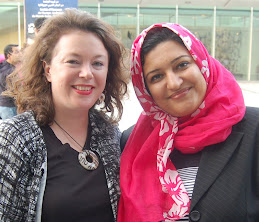“I had to be available,” Marlene said. “It was the only way to keep our sanity.” Although there are some common symptoms, autism presents differently in every person. Kayleigh can read and follow written directions and she likes to cook. She also has unpredictable tantrums, sleep issues, some obsessive compulsive disorder issues and self injury.
She takes medication to reduce anxiety and to help her sleep, but a side effect is weight gain, and she is near 200 pounds. The family also use stress relief techniques – such as having her lie on her stomach and do breathing exercises – to calm her. The McConnells take two cars everywhere they go, in case Kayleigh acts out.
At the onset of a tantrum “she whines, screams, bites her fingers and starts hitting her face,” Marlene said. “She can be very destructive if she’s running. It’s very shocking to see.
“If we’re out in public, the community is like, ‘What’s wrong with her? You shouldn’t have her out here.’ We get a lot of bad comments. I’m past trying to teach people about it – it’s difficult to learn about being sensitive when you’ve got this kid in the store knocking things down.” Instead, she tries to inform people about Kayleigh’s autism in advance, “because you can’t explain it when they’re screaming.” She carries a letter from the doctor everywhere she goes: “I’ve read it so many times, I might as well have it on my T-shirt.”

Kayleigh is a strong swimmer and has frightened her family on trips to the beach by swimming straight out into the ocean. Abdullah also is athletic and used to scare his parents by running away – out of the house, into the street. His father began to take him on family trips to the desert so he could run. Once he ran so far he disappeared from sight, over the dusty horizon. But the desert trips seemed to temper his desire to escape.
Abdullah watches cartoons obsessively and learned to speak Arabic that way, so his family addresses him in classical Arabic – the language of cartoons. They also frame questions in many different ways, to help him understand. An avid fan of the Japanese cartoon series Detective Conan, Abdullah also taught himself Japanese by watching 576 episodes, and has met the Japanese ambassador to Kuwait on several occasions.
The ambassador is impressed with his command of the language. During a typical incident at Kuwait’s Video Games Center, Amaal said, Abdullah stood in the middle of the center and shouted: “Dear seller! Do you have new episodes of Conan?” “Most people were startled to hear his loud voice speaking the language of Arabic cartoons, but I didn't pay any attention to that,” she said, explaining that she is no longer ashamed of her son.
“I don’t want to hide Kayleigh away,” Marlene said. “She’s not something to be embarrassed about.” Love and shame At first, Amaal admits, “I asked myself, what did I do in my life to get a child like him? But when the diagnosis came back to us I knew that the time of work and to do something had come, and I threw behind my back the feelings of guilt and shame.
Then I began to accept my responsibility toward Abdullah, which required a lot of time and work.” This often came at the expense of her other sons, she said. She told them that while she loved them all equally, her biggest concern was for Abdullah. When the boys were young, she spent one hour a day with all three of them, helping them interact through play and pictures. She taught her children that “we are a different family” and that they should be proud of their family’s success.
Today, she said, some people envy her family’s closeness, even regarding Abdullah as the cause of this. Amaal also finds strength in her faith. A Sunni Muslim, she has taught her son the Holy Koran with the help of Sheikh Kamal from the Autism Center. 

Marlene said she finds purpose in helping other families with autistic children cope.
“Where I’ve found something positive, helpful, I want to share it,” she said.
“I try and extend myself. That’s where I get my strength – that and my son, who is not disabled.” Deciding to have another child was “the biggest risk I’ve ever taken,” she said, but Hunter, 15, was worth it. “I’m incredibly grateful that he is who he is.
I just find a lot of things to be grateful for – my husband, my friends, my family – because it could be so bad.” Many a marriage has come unglued under the stress of coping with an autistic child.
“A lot of my friends have got divorced,” she said. “The dads just can’t take it. And some siblings are very caring and involved, but some just can’t get away fast enough.” Marlene sees mostly mothers in the autism support groups, and said most families that are functioning well have found a way to integrate the father into their child’s life.
“I feel that an autistic child, because of their emotional disconnect – they’re the ultimate definition of unconditional love,” she said. “It’s a very thankless disability because you don’t get that love back from them.”

No comments:
Post a Comment